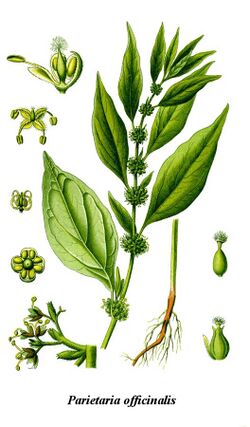Biology:Parietaria officinalis
| Parietaria officinalis | |
|---|---|

| |
| Scientific classification | |
| Kingdom: | Plantae |
| Clade: | Tracheophytes |
| Clade: | Angiosperms |
| Clade: | Eudicots |
| Clade: | Rosids |
| Order: | Rosales |
| Family: | Urticaceae |
| Genus: | Parietaria |
| Species: | P. officinalis
|
| Binomial name | |
| Parietaria officinalis | |
Parietaria officinalis, the eastern pellitory-of-the-wall,[1] also known as upright pellitory[2] and lichwort, is a plant of the nettle family. Its leaves, however, are non-stinging. The plant grows on rubbish and on walls, hence the name.
The pollen is a cause of allergy.[3]
Uses
It was once used in the making of certain metheglins.[citation needed]
Chemistry
The leaves and flowers of P. officinalis contains the flavonoids kaempferol-3-bioside, the 3-glucosides and 3-rutinosides of quercetin, kaempferol and isorhamnetin, 3-sophorosides of quercetin and kaempferol and 3-neohesperosides of kaempferol and isorhamnetin.[4] They also contain caffeoylmalic and two pyrrole acids.[5]
See also
It is in a different family from Anacyclus pyrethrum, also called pellitory.
References
- ↑ (xls) BSBI List 2007, Botanical Society of Britain and Ireland, https://bsbi.org/download/3542/, retrieved 2014-10-17
- ↑ "Parietaria officinalis". Natural Resources Conservation Service PLANTS Database. USDA. https://plants.usda.gov/core/profile?symbol=PAOF. Retrieved 30 January 2016.
- ↑ "Specific hyposensitization in patients allergic to Parietaria officinalis pollen allergen". J Investig Allergol Clin Immunol 4 (6): 283–290. 1994. PMID 7735515.
- ↑ Budzianowki, J.; Skrzypczak, L.; Walkowiak, D. (1985). "Flavonoids of Parietaria officinalis". J. Nat. Prod. 48 (2): 336–7. doi:10.1021/np50038a033.
- ↑ Budzianowski, Jaromir (1990). "Caffeoylmalic and two pyrrole acids from Parietaria officinalis". Phytochemistry 29 (10): 3299–3301. doi:10.1016/0031-9422(90)80203-S. Bibcode: 1990PChem..29.3299B.
- "w19 Wall pellitory (officinalis), Allergy information". Phadia AB. 2002. Archived from the original on 2006-05-23. https://web.archive.org/web/20060523085353/http://www.immunocapinvitrosight.com/templates/Allergens.asp?id=2027. Retrieved 2006-07-08.
External links
Wikidata ☰ Q158578 entry
 |
